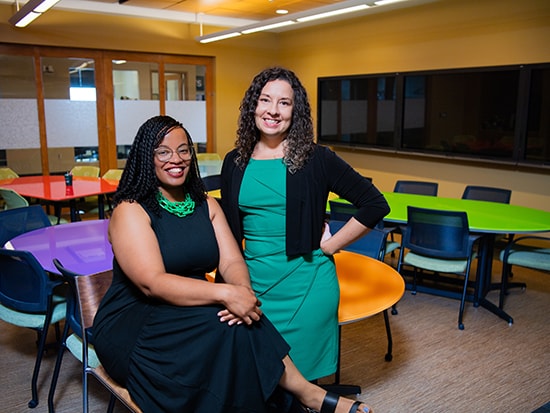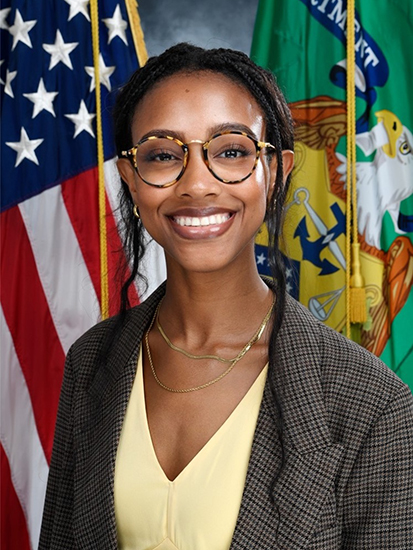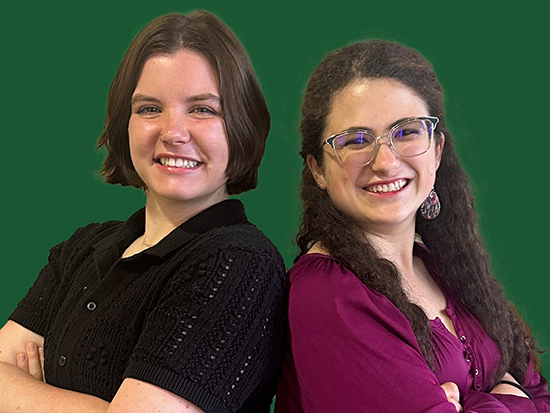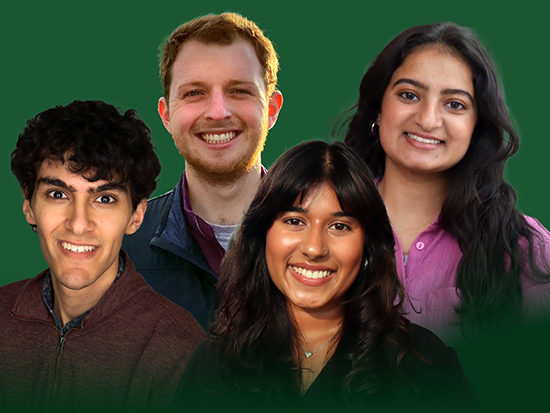 Michelle Cook, Ph.D. (right) and Kamina Perdue (left) are director and assistant director of the UAB Office of National and International Scholarships. The process of applying for competitive awards has its own rewards, including a polished resume and an array of soft skills, Cook says. Plus, "you will never be intimidated by a job interview again." Rhodes. Goldwater. Truman. Fulbright. Gilman. Navigating the tricky world of prestigious scholarships and fellowships can be intimidating without an experienced guide.
Michelle Cook, Ph.D. (right) and Kamina Perdue (left) are director and assistant director of the UAB Office of National and International Scholarships. The process of applying for competitive awards has its own rewards, including a polished resume and an array of soft skills, Cook says. Plus, "you will never be intimidated by a job interview again." Rhodes. Goldwater. Truman. Fulbright. Gilman. Navigating the tricky world of prestigious scholarships and fellowships can be intimidating without an experienced guide.
What do committees really want to see on this essay? What will the interviews be like? Do I have a chance?
Michelle Cook, Ph.D., director of National and International Fellowships and Scholarships at UAB, and Kamina Perdue, the office’s assistant director, specialize in answering these questions. The dynamic duo supports students and recent alumni who are applying for nationally competitive funding for education abroad, research, graduate school and other academic enrichment opportunities.
Since Cook arrived at UAB in 2015 as the assistant director for the office, the university has had record numbers of Fulbright U.S. Student Program recipients. In 2021, when Cook was named director of the office, UAB was recognized by the Department of State as a Top Producing School for its success in the Benjamin A. Gilman International Scholarship Program, which funds study abroad. The same year, UAB had its first Brooke Owens Fellowship recipient, followed by its first Schwarzman Scholar in 2022.
In 2023 and 2024, the university had back-to-back Rhodes finalists. And UAB has built on its consistent success in the Goldwater Scholarship Program, which supports students who show exceptional promise in the natural sciences, engineering and mathematics. Two more Goldwater Scholars were named in May 2025, bringing UAB’s total to 41 since 2002.
What are some important things to know about scholarship success? How does Cook’s office connect with students and work with them through the application process and beyond? We asked Cook and Perdue to share some insights.
1] Talking about yourself takes practice.
 Zahrah Abdulrauf is a two-time Rhodes finalist who received several other national awards while at UAB, including the university’s first Schwarzman Scholarship, and is now working as an associate research scholar at Yale Law School through the Tobin Predoctoral Fellowship program. Photo courtesy Zahrah AbdulraufCook often begins working with a student by engaging them in conversation. “I’ll ask them questions to get them talking and learn about their experiences,” she said. “They may start telling me a story, and after a while I’ll say, ‘That was the first paragraph of your personal statement.’”
Zahrah Abdulrauf is a two-time Rhodes finalist who received several other national awards while at UAB, including the university’s first Schwarzman Scholarship, and is now working as an associate research scholar at Yale Law School through the Tobin Predoctoral Fellowship program. Photo courtesy Zahrah AbdulraufCook often begins working with a student by engaging them in conversation. “I’ll ask them questions to get them talking and learn about their experiences,” she said. “They may start telling me a story, and after a while I’ll say, ‘That was the first paragraph of your personal statement.’”
Students may not know that they have a story to tell — or how to tell it. Zahrah Abdulrauf is a two-time Rhodes finalist who received several other national awards while at UAB, including the university’s first Schwarzman Scholarship, and is now working as an associate research scholar at Yale Law School through the Tobin Predoctoral Fellowship program. She had started out in UAB’s Undergraduate Neuroscience Program, then switched to a double major in cognitive science and philosophy with a minor in economics.
“I remember sitting down with her and she said, ‘My CV makes no sense. I have all this volunteering and experience from when I was in STEM and pre-med that does not match up with me now,’” Cook said. “I helped her see that it really did fit in — it was all about creating opportunities for others. When you are too close to something, you might not know how it lands from an outside perspective. We can help students see that, even when they might not see it themselves.”
It is a pleasure to spend time with students, “have them just tell us about themselves, and then help them understand what story they are actually trying to tell,” Perdue added. “I enjoy finding out who they are as people, what drives them, and then being able to say, ‘This is the through line I see, and here is how we can put that puzzle together to show who you are and how you are a match for this particular award.’”
The requirements for prestigious scholarships and fellowships vary widely. Some insist on a host of reference letters. Some have notoriously difficult interviews. Others have no interview or reference requirements at all; they base their judgments almost exclusively on the qualifications and experiences they find in a student’s CV. But most require one or more personal statements — essays hovering around 1,000 words — and this can be one of the toughest aspects of the application process. Many times, “everything rides on those essays,” Cook said. “Your voice may be the only voice that the committee hears.”
So what, out of all the things you could say, should you say? “Personal statement writing sounds scary, but it also sounds simple — you are just talking about yourself,” Cook said. “It’s actually very hard. You are not taught to do this in school, even though you will have to do it if you spend any time in academia.”
Cook, whose background is in teaching composition, was drawn into the scholarships world in graduate school when a faculty member asked her to help read over students’ Fulbright essays. Now, she spends much of her time helping students learn to translate their dreams and passions into compelling personal statements. “This job is everything I love about teaching, without having a grade on the line,” Cook said.
2] You are more competitive than you think.
 2025 Goldwater Scholars Zoey Swalley (left) and Juliana Eberhardt (right)Sometimes, freshmen will show up at Cook’s office in Lister Hill Library with their eyes fixed on a Rhodes or other major award and ask, “How do I make sure I’m on track?” More often, seeing an older sibling or friend apply plants a seed and motivates a student to seek her out, Cook says.
2025 Goldwater Scholars Zoey Swalley (left) and Juliana Eberhardt (right)Sometimes, freshmen will show up at Cook’s office in Lister Hill Library with their eyes fixed on a Rhodes or other major award and ask, “How do I make sure I’m on track?” More often, seeing an older sibling or friend apply plants a seed and motivates a student to seek her out, Cook says.
The Honors College is particularly attuned to identifying promising students and directing them to Cook’s office. (All four UAB students who won Fulbright awards this year are members of the Honors College.) Certain faculty, especially ones who won an elite award themselves, are always looking out for students who would make good candidates, too. (“I wish I got more recommendations from faculty,” Cook noted.)
Cook is always recruiting. For instance, she makes a point to be a judge at each UAB Expo, where undergraduates present on their research. “I’ll say, ‘What year are you? Are you thinking about a gap year? You should come talk to me,’” Cook said.
Cook often must convince students that they would make good candidates. “Many of our students don’t think they are high-achieving because all their friends are doing these same things,” Cook said. “Especially if they are doing slightly less or doing it in a different way than their friends or classmates, they don’t think they fit the mold. What I often tell them is ‘You are more competitive than you think you are. You don’t have to be the kind of person who has been pushing at it since the eighth grade. You can be a late bloomer who has just been quietly plugging away. If you are asking me questions about awards, you are probably on the right track already.’”
Students may also think that, because they have had to work a job to help pay for school, they won’t be able to compete with others who can devote more time to extracurriculars, Perdue adds. “We help them see that work experience can certainly be a part of their applications for many of these awards, if we talk about it and think about it in the right way,” she said.
3] Successful applications call for strategy — and you can learn.
 Seth Hubbard, second from left, with UAB's other Fulbright U.S. Student Program awardees for 2025.Cook shows students how to use every part of an application to their advantage. On one well-known scholarship’s application, Cook points out short text fields that offer students an extra opportunity to humanize their stories. On another, she will explain what the committee really wants to hear in response to a prompt about a difficult experience. “It is always really helpful to see the application as a package,” Cook said. “It’s not just, ‘Here’s my essay.’ That takes mental gymnastics. There are a lot of moving pieces involved and strategizing.”
Seth Hubbard, second from left, with UAB's other Fulbright U.S. Student Program awardees for 2025.Cook shows students how to use every part of an application to their advantage. On one well-known scholarship’s application, Cook points out short text fields that offer students an extra opportunity to humanize their stories. On another, she will explain what the committee really wants to hear in response to a prompt about a difficult experience. “It is always really helpful to see the application as a package,” Cook said. “It’s not just, ‘Here’s my essay.’ That takes mental gymnastics. There are a lot of moving pieces involved and strategizing.”
“It can seem as though they are all asking the same questions,” Perdue said. “But each scholarship actually has a particular focus, so you need to be able to keep that in mind and tell your story accordingly.”
One of the concepts Cook and Perdue help students grasp is the idea of awards as building blocks. “The Rhodes is not going to be the first big award you win,” Cook said. “You don’t have to start with other nationally competitive scholarships. It could be honors you have won in your field that led you to present at a national conference. Or maybe you took part in a competitive summer research opportunity or got a grant from something like the American Kidney Association. Getting that outside vetting helps.”
Seth Hubbard, a native of Midland City, Alabama, who graduated from UAB in 2023 with degrees in chemistry and neuroscience, illustrates that progression. In 2020, he was accepted into the Clinton Global Initiative University program. Then, while he was working on studies of frog rod photoreceptors in the lab of UAB vision researcher Alecia Gross, Ph.D., Hubbard received a $2,500 grant from the Fight for Sight Foundation in August 2021. The following March, he was selected as a Barry Goldwater Scholar. Next, he was selected as a postbaccalaureate fellow in the NIH’s National Center for Advancing Translational Science. And in October 2024, Hubbard was one of only 16 finalists from District 7 for the Rhodes Scholarship.
Earlier this summer, Hubbard texted Cook to let her know he was applying for another scholarship. “I said, ‘Do you want some extra eyes on it?’” Cook recalled. “He said, ‘No, I’m going to use this part of my Fulbright application, and this part of my Rhodes and so on. He has learned how to do it. That’s what I like to hear.”
4] Every student needs something unique.
One of the major roles that she and Perdue fill, Cook said, is “giving students what they need.” Some students “need plenty of feedback and handholding — they are really scared and have a lot of imposter syndrome.” To get them going, or motivate them to meet an impending deadline, Perdue might join a student virtually in the Google Doc where they are writing their essay. “Kamina will sit in your Google Doc with a lawn chair — just camp out,” Cook said. “Some students want that surveillance and need it. Others don’t.”
Interview prep is another milestone. Cook and Perdue will let students know what to expect, especially with certain top scholarships that are famous for their aggressive interviewing style or tricky questions. Cook has a network of faculty and staff on campus, along with local alums, who have experience with certain scholarships and fellowships. She will call on them to take part in mock interviews in the run-up to the real thing. “Sometimes, I get people who I know might be intimidating because a student needs to practice with someone like that,” Cook said. “We want them to know ‘This is not your mama’s interview.’ It’s a balance. We need them to prepare for how difficult and intense it can be, but also help them see that they can do it.”
5] Applying for top scholarships teaches you skills for a lifetime — even if you are not selected.
Over the course of working with hundreds of students, Cook has also seen that the process of applying for competitive awards has its own rewards, including a polished resume and an array of soft skills. “There are so many transferrable skills” that come from applying for one of these awards, Cook said. Cover letters, an inescapable part of most careers, “are just a form of personal statement,” she noted. And the strenuous preparation for competitive scholarship interviews? Once you go through that, Cook said, “you will never be intimidated by a job interview again.”